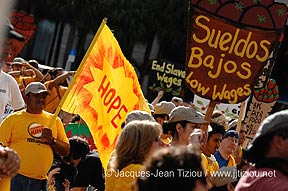Even better than I thought: victory for the Coalition of Immokalee Workers against the Florida Tomato Growers Exchange, too
Here's a pretty old post from the blog archives of Geekery Today; it was written about 17 years ago, in 2008, on the World Wide Web.


On Friday I mentioned that the Coalition of Immokalee Workers had just announced victory in the Burger King penny-a-pound pass-through campaign. It turns out that the news is even better than I thought. The news reports that have come out since the announcement reveal that not only did Burger King agree to join the penny-a-pound, but the Florida Tomato Growers’ Exchange (the cartel and legislative lobby which represents 90% of Florida tomato farm owners) has also substantially caved in the face of pressure from the CIW and its supporters. Although they are still saying that member farms should not participate, they’ve given up on the hardball tactics they were trying to use to enforce cartel discipline.
Whether workers actually get the increase hinges on tomato growers’ participation.
McDonald’s and Yum! Brands, the world’s biggest fast-food chain and restaurant company, respectively, already have agreed to the raise; Yum!, parent company of Taco Bell, Pizza Hut and more, signed on in 2005; McDonald’s in 2007.
Workers got the extra money for two seasons, then the Florida Tomato Growers Exchange threatened $100,000 fines to any grower member who participated, which stalled the payouts. They’ve since been collecting in escrow. About 90 percent of the state’s tomato growers belong to the exchange.
But the exchange announced Thursday it would no longer threaten members with those fines, said executive vice-president Reggie Brown, in response to
inordinate and inappropriate focus on the (fines) by the media.
Brown is still muttering baseless and murky threats about federal antitrust laws and how participating in the pass-through program could somehow subject growers to lawsuits.
(Subjected to lawsuits by whom? Is that supposed to be a prediction or a threat?) So there is still a danger of some very dirty pool and government union-busting here. But the FTGE looks like it’s on the ropes, and their retracting the threat of fines makes it much more likely that individual farm owners will begin participating in the pass-through program again, if nothing else as an incentive for attracting workers away from non-participating farms — an incentive which it costs the farm owners nothing to offer.
In the meantime, the fast-food participants have announced that they will continue to honor the penny-per-pound agreement and pay into the escrow account in case growers change their minds:
McDonald’s and Yum Brands, the world’s biggest fast-food chain and restaurant company, respectively, have agreed to the raise …. Yum, parent company of Taco Bell, Pizza Hut and more, signed on in 2005; McDonald’s in 2007.
Workers received the extra money for two seasons, but then the threatened fines from the exchange stalled payouts. Both companies have been honoring the agreement with the raise amount collecting in escrow.
They say they will continue to honor the agreement.
It’s the right thing to do, and we encourage others to follow our lead,said Taco Bell spokesman Rob Poetsch.While we continue to set aside monies for the affected workers, we’re disappointed that the intended recipients are being penalized.Now that the threat of fines is gone, members and supporters of the Coalition of Immokalee Workers are wondering what it might mean.
If the (threats of fines) are in fact being lifted, that would be good news,said coalition co-founder Lucas Benitez.We hope our agreements with Yum and McDonald’s will be allowed to again function as they had in the past and workers received a fairer wage.
Eric Schlosser, who has been doing some very good work in reporting on the C.I.W.’s struggle, offers an analysis that combines some incredibly muddled history with some admirably clear-sighted analysis of the current position of the C.I.W. within the farmworkers’ struggle:
This may be the most important victory for American farmworkers since passage of California’s Agricultural Labor Relations Act in 1975. That bill heralded a golden age for farm workers. But the state government apparatus it created, the Agricultural Labor Relations Board, got taken over by the growers in the 1980s and watered down the reforms. In Florida, the Coalition has chosen a different path, avoiding government and putting pressure on the corporations at the top of nation’s food chain. The strategy clearly works and can be emulated by other workers in other states. In the absence of a government that cares about the people at the bottom, here’s a way to achieve change.
–Eric Schlosser, quoted by Katrina vanden Heuvel, The Nation (2008-05-23): Sweet Victory: Coalition for Immokalee Workers Wins
The muddle, of course, has to do with the California Agricultural Labor Relations Board and the mythical golden age for farmworkers.
Actually the ALRB is exactly what strangled the dynamism of the once-vibrant United Farm Workers, by pulling California farmworkers’ unions into the smothering embrace of bureaucratic patronage, which had strangled the dynamism of the rest of the labor movement for decades under the Wagner/Taft-Hartley system — thus capturing a once revolutionary movement and converting it into just another arm of the State-domesticated labor establishment. It should be no surprise that within a decade the ALRB had been completely captured by the farm bosses; government boards are always captured by the most powerful and best-connected players. Any look at history or at the basics of political economy should quickly demonstrate that Schlosser’s in the absence of
is really a statement of universal truth, not a remark on the sad state of affairs today: there will never be a government that cares about the people on the bottom. It’s the State that largely puts them on the bottom in the first place and then keeps them there. Any scraps that it may throw down from the master’s table are intended to keep the rest of us just barely fed enough to keep begging, instead of giving up and taking matters into our own hands.
What Schlosser is right about is that the C.I.W.’s strategy works, and deserves emulation. What I’d want to add, and stress, is that it works not despite the fact that they have avoided entangling themselves in the government labor bureaucracy; it works because they have. The C.I.W. has won all these struggles precisely because they have used creative fight-to-win tactics (especially secondary boycotts) that would be completely illegal if they were subject to the bureaucratic discipline of the NLRB. It’s precisely the freedom that they enjoy as a wildcat union, ineligible for NLRB recognition, which has allowed them to disregard the usual modesty in demands and politeness in means that the Taft-Hartley rules demand.
These victories with the FTGE and Burger King are not the end. The C.I.W. has announced that it will now challenge grocery stores and other fast food restaurants to join Yum Brands, McDonald’s, and Burger King in the pass-through agreement. Every victory in this campaign has made the next victory come quicker: the Taco Bell boycott took four years for victory (from 2001 to 2005); the C.I.W. won an agreement from McDonald’s after two years of active campaigning (from March 2005 to April 2007); and these victories in campaigns against Burger King and the FTGE took just over one year (from April 2007 to May 2008). Lucas Benitez has indicated that the C.I.W. will most likely target Chipotle and Whole Foods next — that is, major tomato buyers who each have a significant stake in maintaining a brand image of corporate social responsibility. There’s good reason to hope that the trend will continue and these campaigns will lead to a speedy victory.
Fellow workers, this past week’s victories for creative extremism and wildcat unionism are both an inspiration and a reminder. We should never forget that the workers have more power standing with our hands in our pockets than all the wealth and weapons of the plutocrats and politicians. Yes, we can do it–ourselves. And we will.
See also:
- GT 2008-05-23: ¡Sí se puede! Victory for the Coalition of Immokalee Workers in the Burger King penny-per-pound campaign
- GT 2007-12-06: Solidaridad
- GT 2007-11-30: Coalition of Immokalee Workers marches in Miami
- GT 2007-04-19: ¡Sí se puede! The CIW wins a groundbreaking wages and conditions agreement with McDonald's
- GT 2005-03-31: Anarquistas por La Causa
- GT 2005-03-23: ¡El pueblo unido jamás será vencido!
Charles, what exactly do you mean by wildcat unionism?
steven,
I mean forms of unionism carried out by means outside of the formal notification, negotiation, and collective bargaining procedures established by the National Labor Relations Board. (Or, by analogy, other forms of government establishment of officially recognized unions, such as the ALRB in California and similar labor bureaucracy systems in other countries.) Wildcat unionism as opposed to establishmentarian unionism operates through the free association of workers, and the forms I support achieve their goals through coordination of decisions to withhold labor, boycott, slow down work, or what have you, without relying on a legal or regulatory apparatus to force the boss into collective bargaining with a designated union agent. (In the case of the C.I.W., they adopt wildcat union tactics by necessity — notably including the use of secondary boycotts against fast food chains, the Boot The Bell campaign, etc. — because the existing loopholes in the NLRB system exclude farmworkers’ unions from NLRB recognition, or the privileges and regulations that accompany it.)
I coined the term by analogy with the wildcat strike. I also like it because it recalls Ralph Chaplin’s famous Sabo-tabby logo for the I.W.W.
Does that help clarify?
Yes. Thank you very much.